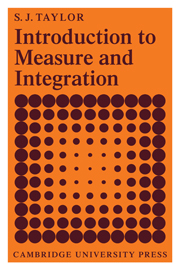Book contents
- Frontmatter
- Contents
- Preface
- 1 Theory of sets
- 2 Point set topology
- 3 Set functions
- 4 Construction and properties of measures
- 5 Definitions and properties of the integral
- 6 Related spaces and measures
- 7 The space of measurable functions
- 8 Linear functionals
- 9 Structure of measures in special spaces
- Index of notation
- General Index
9 - Structure of measures in special spaces
Published online by Cambridge University Press: 21 March 2010
- Frontmatter
- Contents
- Preface
- 1 Theory of sets
- 2 Point set topology
- 3 Set functions
- 4 Construction and properties of measures
- 5 Definitions and properties of the integral
- 6 Related spaces and measures
- 7 The space of measurable functions
- 8 Linear functionals
- 9 Structure of measures in special spaces
- Index of notation
- General Index
Summary
In the present book most of the theory of measure and integration has been developed in abstract spaces, and we have used the properties of special spaces only to illustrate the general theory. The present chapter, apart from §9.4, is devoted to a discussion of properties which depend essentially on the structure of the space.
The first question considered is that of point-wise differentiation. In the Radon–Nikodym theorem 6.7 we defined the derivative dμ/dv of one measure with respect to another for suitable measures μ, v: but the point function dμ/dv obtained is only determined in the sense that the equivalence class of functions equal almost everywhere is uniquely defined. This means that at no single point (except for those points which form sets of positive measure) is the derivative defined by the Radon–Nikodym theorem. In order to define dμ/dv at a point x, the local topological structure of the space near x has to be considered. It is possible to develop this local differentiation theory in fairly general spaces, but only at the cost of complicated and rather unnatural additional conditions: we have decided instead to give the detailed theory only in the space R of real numbers where the term derivative has a clear elementary meaning.
There are several ways of defining an integral with properties similar to those obtained in Chapter 5. So far in this book we have considered definitions which start from a given measure defined on a suitable class of sets. In §9.4 we describe the Daniell integral and show that, under suitable conditions this can be obtained in terms of a measure.
Information
- Type
- Chapter
- Information
- Introduction to Measure and Integration , pp. 223 - 260Publisher: Cambridge University PressPrint publication year: 1973
